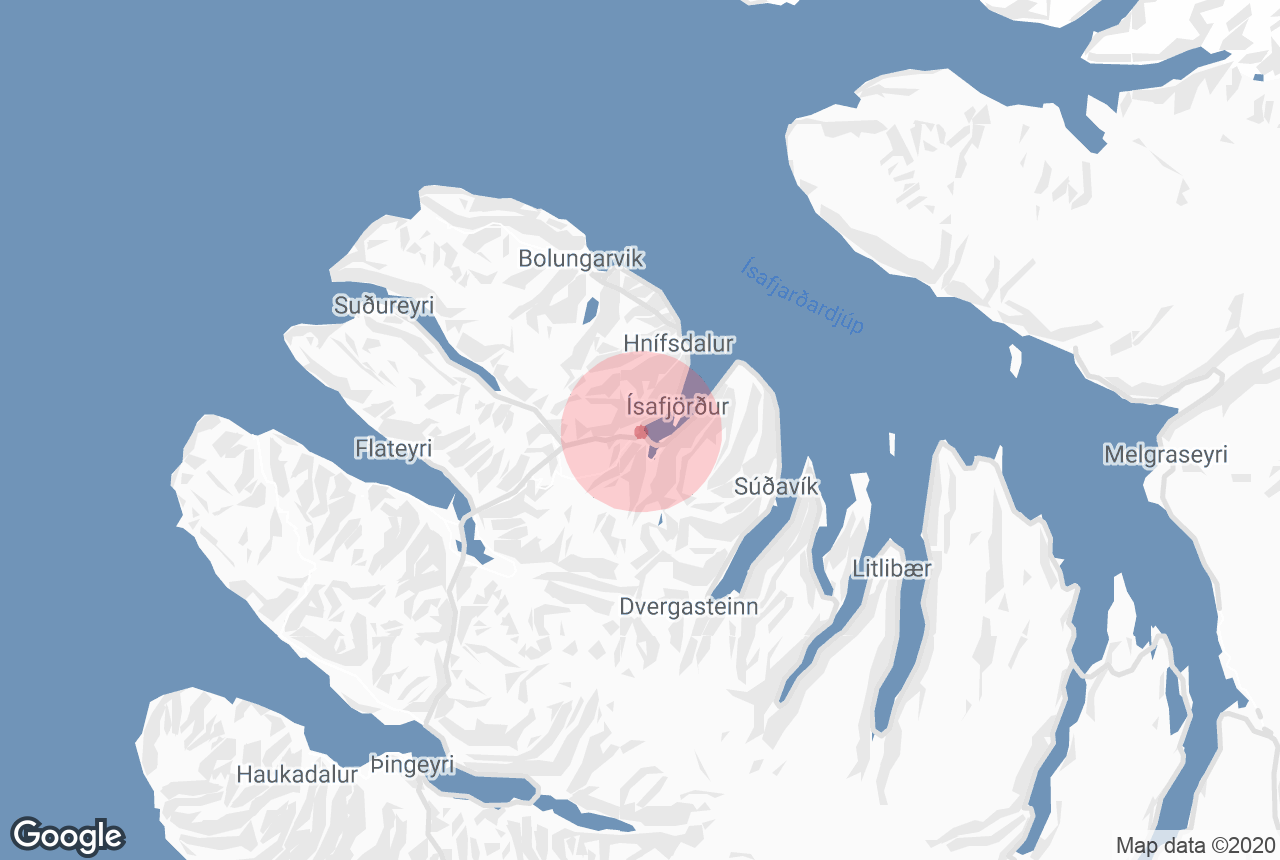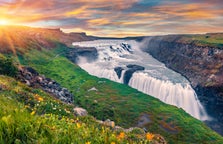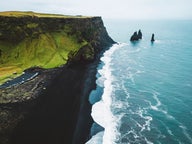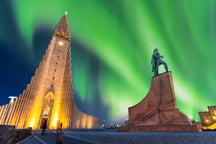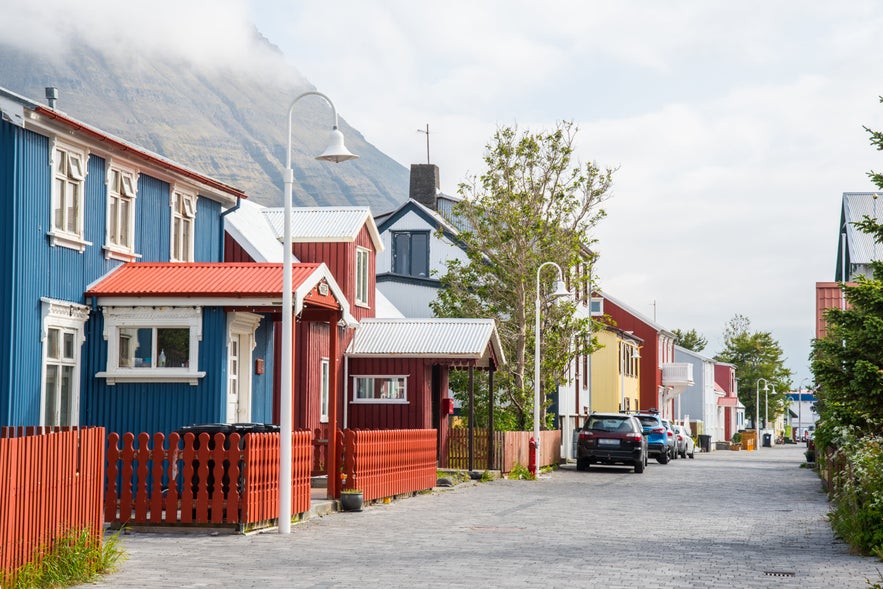
Dank ihrer Lage ist Isafjördur ein perfekter Ausgangspunkt, um die Region zu erkunden. Von hier aus erreichen Besucher Meeresklippen, ruhige Strände und schwer zugängliche Naturschutzgebiete. Zahlreiche Westfjorde-Tagestouren starten in Isafjördur – ideal für alle, die kein Auto haben oder mehr von der Region sehen möchten.
Ein beliebtes Highlight dieser Touren ist Dynjandi, einer der bekanntesten Wasserfälle der Westfjorde. Manche Routen bieten sogar eine kombinierte Farm- und Wasserfalltour ab dem Hafen von Isafjördur an, die dir die Natur und das Landleben der Region näherbringt.
Warum du unseren Inhalten vertrauen kannst
Guide to Iceland ist die vertrauenswürdigste Reiseplattform Islands und hilft jedes Jahr Millionen von Besuchern. Alle Inhalte werden von lokalen Experten erstellt und geprüft, die Island in- und auswendig kennen. So kannst du dich auf zuverlässige, aktuelle und präzise Reisetipps verlassen.
Im Sommer ist Isafjördur zudem ein beliebter Anlaufpunkt für Kreuzfahrtschiffe. Für Passagiere mit wenig Zeit gibt es verschiedene Landausflüge ab Isafjördur, die in wenigen Stunden die wichtigsten Sehenswürdigkeiten und Naturschönheiten ansteuern und rechtzeitig zum Hafen zurückkehren.
Isafjördur und die Westfjorde lassen sich auch in Island-Reisepakete integrieren, sodass du dieses abgelegene Ziel mit anderen Highlights des Landes kombinieren kannst.
Das Wichtigste auf einen Blick
-
Isafjördur ist das zentrale Tor zur Erkundung der Westfjorde.
-
Die Stadt bietet eine Mischung aus Kultur und Outdoor-Aktivitäten: Museen, Festivals, Wandern, Kajakfahren und Tierbeobachtung.
-
Isafjördur war traditionell ein Fischerort, doch die Wirtschaft verlagert sich zunehmend auf den Tourismus.
-
Die Westfjorde begeistern mit Naturwundern wie dem Dynjandi-Wasserfall, den Latrabjarg-Klippen und dem Raudisandur-Strand.
-
Ein Besuch im Sommer wird empfohlen, da die Bedingungen und Straßenverhältnisse im Winter herausfordernd sind.
Warum Isafjördur besuchen?
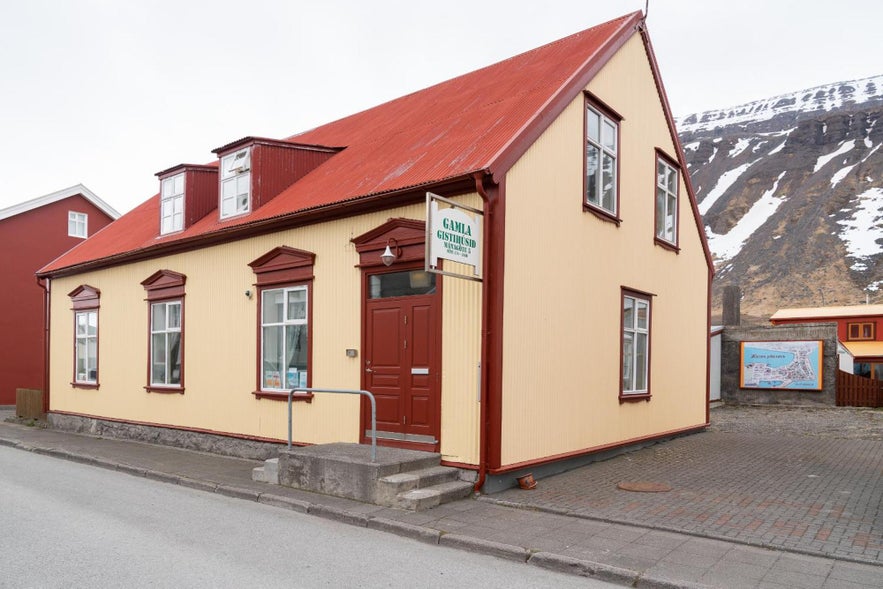
Vor der Kulisse von Bergen und Meer gilt Isafjördur als inoffizielle Hauptstadt der Westfjorde. Viele buchen ihre Unterkunft in Isafjördur, um von Hotels, Einkaufsmöglichkeiten, kulturellen Angeboten und einer lebendigen Gastronomieszene mit lokalen Craft-Bieren und dem besten frischen Fisch Islands zu profitieren.
Die Altstadt von Isafjördur ist das Herzstück der Stadt: Hier finden sich gut erhaltene Gebäude aus dem 18. Jahrhundert. Die farbenfrohen Häuser dienten einst als Handelsposten, Wohnhäuser und Lagerhallen und geben heute einen Einblick in die Vergangenheit – perfekt für einen malerischen Spaziergang.
Auch außerhalb der Stadt gibt es viel zu erleben, etwa bei Ausflügen ins Hornstrandir-Naturschutzgebiet. Abenteuerlustige können auf einer viertägigen Westfjorde-Tour sowohl die Highlights der Stadt als auch die abgelegene Umgebung entdecken.
Geschichte von Isafjördur
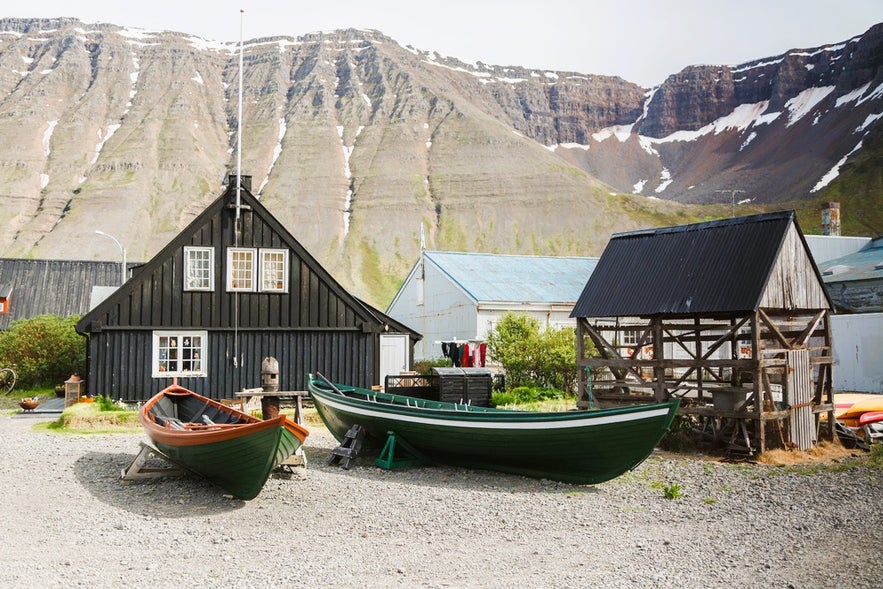 Laut dem berühmten isländischen Siedlungsbuch wurde der Skutulsfjördur bereits im 9. Jahrhundert von Helgi Magri Hrólfsson besiedelt.
Laut dem berühmten isländischen Siedlungsbuch wurde der Skutulsfjördur bereits im 9. Jahrhundert von Helgi Magri Hrólfsson besiedelt.
Im 16. Jahrhundert wuchs Isafjördur rasch und wurde dank seines Naturhafens zum Zentrum für Handel und Fischerei. 1786 erhielt der Ort das Stadtrecht.
Isafjördur war jahrzehntelang eines der größten Fischereigebiete Islands. Rückgänge der Fischbestände, Fangbeschränkungen und größere Fischereien in Reykjavik führten jedoch zu einem wirtschaftlichen Wandel – heute steht der Tourismus im Fokus.
Aktivitäten in Isafjördur
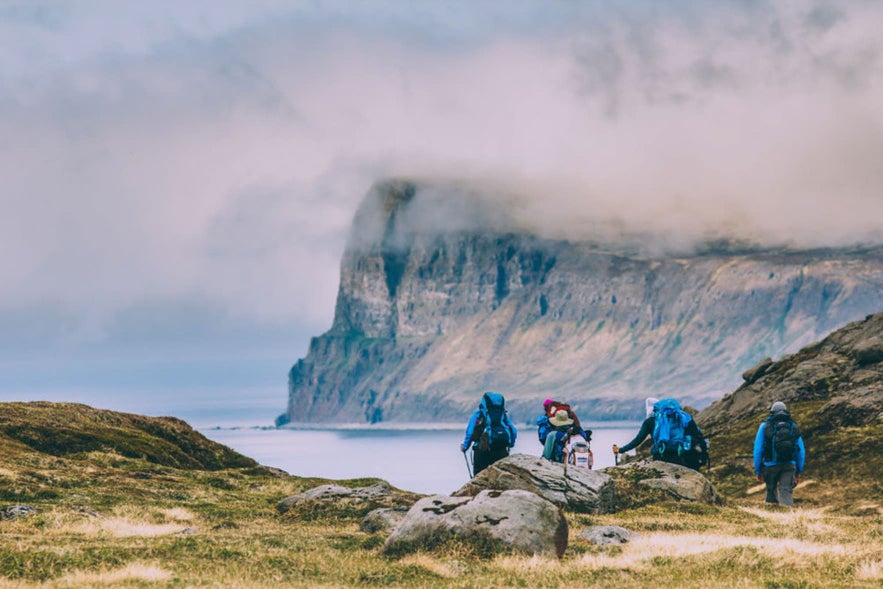 Isafjördur bietet eine Mischung aus kulturellen Highlights und Outdoor-Aktivitäten und ist damit ein lohnenswerter Stopp in den Westfjorden. Die Stadt verbindet Geschichte, Kreativität und lokalen Charme mit einem Zugang zu spektakulären Landschaften und Küstenwildtieren.
Isafjördur bietet eine Mischung aus kulturellen Highlights und Outdoor-Aktivitäten und ist damit ein lohnenswerter Stopp in den Westfjorden. Die Stadt verbindet Geschichte, Kreativität und lokalen Charme mit einem Zugang zu spektakulären Landschaften und Küstenwildtieren.
In den folgenden Abschnitten findest du verschiedene Möglichkeiten, die Region zu erleben – von kulturellen Sehenswürdigkeiten und saisonalen Events bis zu Aktivitäten auf dem Wasser und Naturhighlights, die du auf deinen Reiseplan setzen solltest.
Kulturelle Sehenswürdigkeiten in Isafjördur
Isafjördur ist zwar klein, hat aber eine lebendige Kulturlandschaft, geprägt von Geschichte, Kreativität und der Nähe zum Meer. Die folgenden Highlights sind ein guter Einstieg für alle, die das lokale Erbe entdecken möchten.
Westfjorde Heritage Museum
Im Westfjorde Heritage Museum erfährst du mehr über die Geschichte und Bedeutung der Region. Das Museum befindet sich in einem der ältesten Gebäude Islands im Stadtteil Nedstikaupstadur, der die größte Sammlung alter Holzhäuser des Landes beherbergt.
Kulturhaus
Das Kulturhaus ist in einem der historisch bedeutendsten Gebäude Isafjördurs untergebracht und beeindruckt mit einer Mischung aus alter und moderner Architektur – ein Blickfang, auch wenn du nicht hineingehst. Ursprünglich als Krankenhaus genutzt, beherbergt es heute eine Bibliothek, ein Museum und Ausstellungsräume, die alle einen tiefen Einblick in die isländische Kultur bieten.
Outdoor-Aktivitäten in Isafjördur
Isafjördur ist ein tolles Ziel für alle, die gern draußen unterwegs sind. Die Küstenlage und die umliegende Natur bieten in den wärmeren Monaten zahlreiche Möglichkeiten – von Kajaktouren und Wanderungen bis zu Vogel- und Walbeobachtungen.
Kajakfahren in Isafjördur
Kajaktouren sind eine großartige Möglichkeit, Island im Sommer zu erkunden – und Kajakfahren ab Isafjördur macht da keine Ausnahme. Du paddelst durch die Westfjorde, genießt fantastische Ausblicke und hältst Ausschau nach Robben und heimischen Seevögeln.
Vogelbeobachtung in Isafjördur
Isafjördur und die Westfjorde sind ein Paradies für Vogelliebhaber. Lummen, Küstenseeschwalben und Papageitaucher sind hier zu Hause.
Vigur Island vor der Küste von Isafjördur ist berühmt für ihre beeindruckenden Vogelkolonien. Besucher können die Insel bei einer Kajak- und Wildtier-Tour selbst erleben.
Walbeobachtung in Isafjördur
Walbeobachtungstouren gehören zu den beliebtesten Aktivitäten in Island – ein Muss für Tierfreunde in den Westfjorden.
Diese familienfreundliche Walbeobachtungstour ab Isafjördur bietet beste Chancen, Wale und Delfine in ihrer natürlichen Umgebung zu beobachten.
Wandern im Hornstrandir-Naturschutzgebiet
Isafjördur ist auch einer der Hauptzugänge zum Hornstrandir-Naturschutzgebiet, einer der abgelegensten und unberührtesten Regionen Islands. Hier leben der Polarfuchs – das einzige heimische Säugetier Islands – und über 250 Pflanzenarten.
Wer wenig Zeit hat, kann eine geführte Tageswanderung buchen. Für ein intensiveres Erlebnis empfiehlt sich eine Übernachtung im Zelt, um die wilde Schönheit des Reservats voll auszukosten. Mit dem Boot von Isafjördur nach Hornvik gelangst du zu Wanderwegen und Campingplätzen – denn das Gebiet ist nicht mit dem Auto erreichbar. Denke daran, die Rückfahrt separat zu buchen.
Outdoor-Events in Isafjördur
Wer zu Ostern nach Isafjördur reist, kann beim kostenlosen Musikfestival Aldrei For Eg Sudur lokale isländische Bands entdecken oder beim Ski Week Festival an Outdoor-Aktivitäten teilnehmen.
Weitere Highlights der Westfjorde
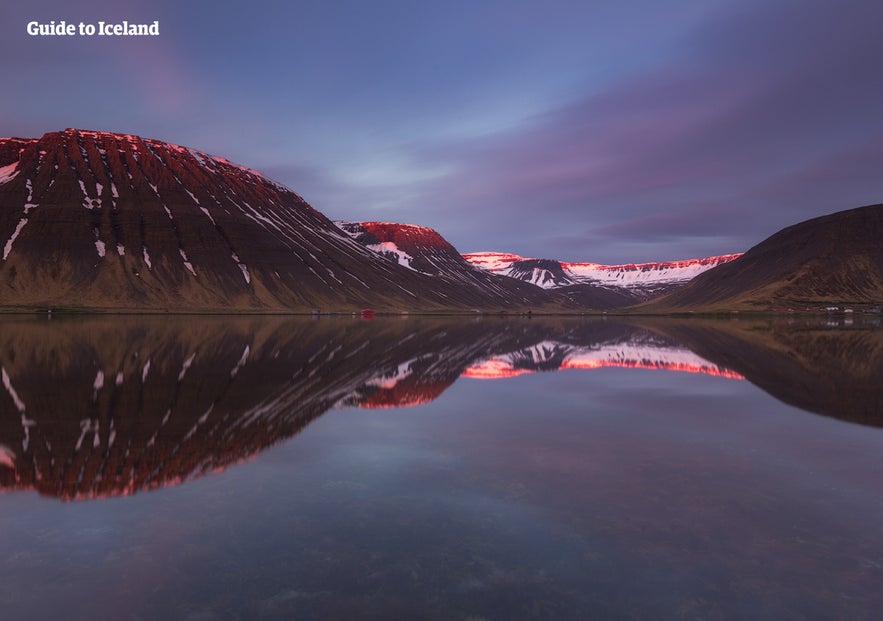
Die Westfjorde bieten einige der eindrucksvollsten Landschaften Islands; viele davon sind im Rahmen eines Tagesausflugs ab Isafjördur erreichbar. Die Anfahrt führt durch Fjorde, Berge und ruhige Küstenabschnitte – schon die Fahrt ist ein Erlebnis.
Von mächtigen Wasserfällen über dramatische Klippen bis zu farbenfrohen Stränden: Die folgenden Naturwunder zeigen die wilde Schönheit der Region. Jedes Ziel hat seinen eigenen Reiz – ob für Fotografie, Tierbeobachtung oder einfach zum Genießen der Aussicht.
Dynjandi-Wasserfall
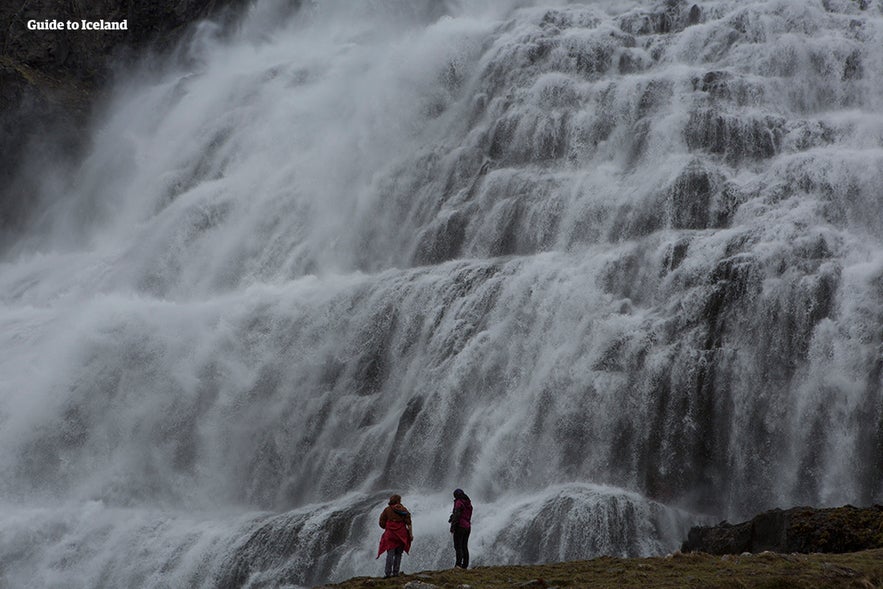
Mit einer Höhe von rund 100 Metern, einer Breite von 30 Metern am oberen Rand und fast der doppelten Breite am Fuß ist er auch der größte Wasserfall der Westfjorde. Er liegt etwa 60 Kilometer westlich von Isafjördur und ist ein beliebtes Ziel für Tagesausflüge.
Latrabjarg-Klippen
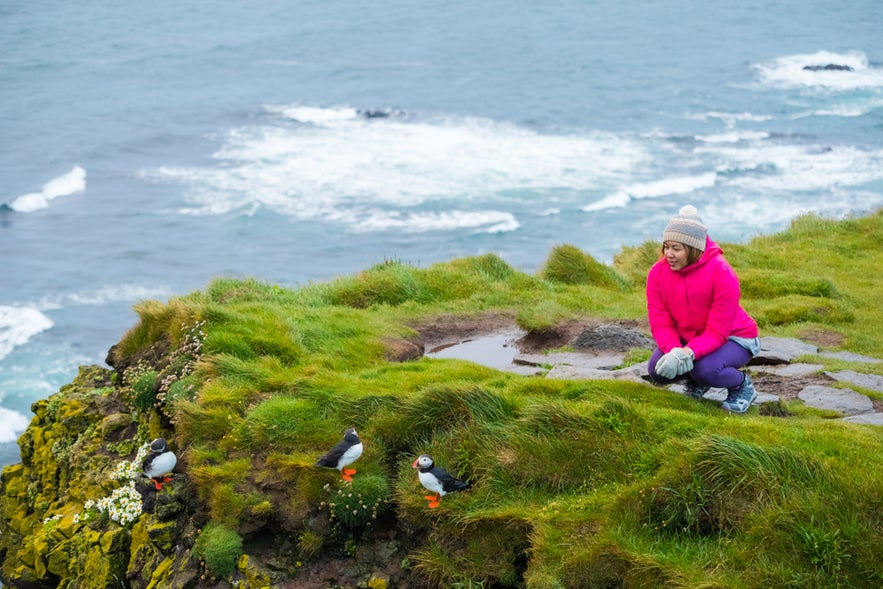 Die Latrabjarg-Klippen sind der westlichste Punkt Islands. Sie liegen am Rand der Westfjorde, etwa 180 Kilometer von Isafjördur entfernt – die Anreise lohnt sich aber. Im Sommer leben hier schätzungsweise fünf Millionen Seevögel – ein Muss für Vogelfans.
Die Latrabjarg-Klippen sind der westlichste Punkt Islands. Sie liegen am Rand der Westfjorde, etwa 180 Kilometer von Isafjördur entfernt – die Anreise lohnt sich aber. Im Sommer leben hier schätzungsweise fünf Millionen Seevögel – ein Muss für Vogelfans.
Küstenseeschwalben, Eiderenten, Lummen und Tordalke brüten an den Klippen, doch die Hauptattraktion ist die riesige Kolonie der Papageitaucher. Die Vögel sind geschützt und bieten viele Fotomöglichkeiten.
Raudisandur-Strand
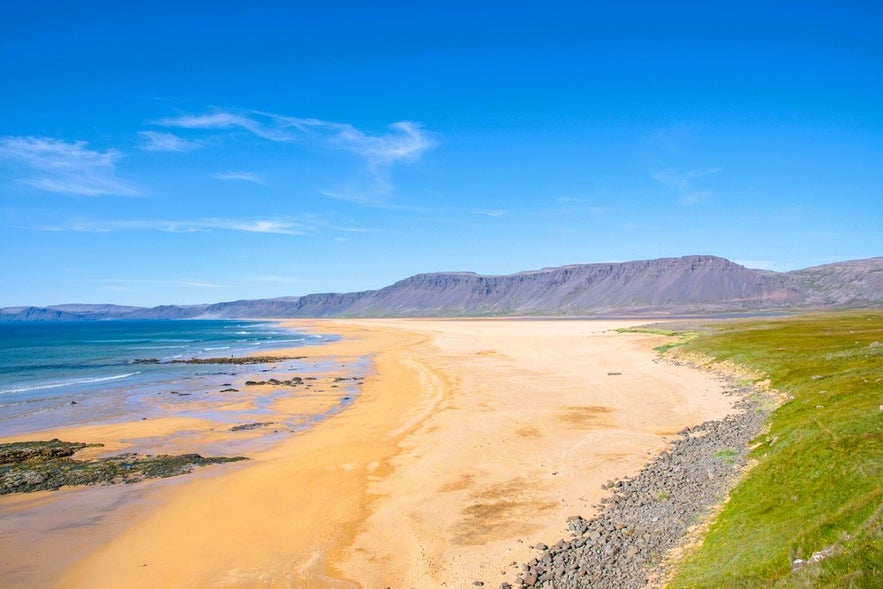 Die meisten Strände Islands bestehen aus schwarzem Vulkansand. Raudisandur hingegen leuchtet in Rot- und Goldtönen – was einzigartig ist und darauf zurückzuführen, dass die Westfjorde nicht mehr vulkanisch aktiv sind.
Die meisten Strände Islands bestehen aus schwarzem Vulkansand. Raudisandur hingegen leuchtet in Rot- und Goldtönen – was einzigartig ist und darauf zurückzuführen, dass die Westfjorde nicht mehr vulkanisch aktiv sind.
Der Strand liegt etwa 150 Kilometer außerhalb von Isafjördur, nahe den Latrabjarg-Klippen an der Westküste. Er ist ein beliebter Ort für Vogel- und Robbenbeobachtung.
Anreise nach Isafjördur
Die Anreise nach Isafjördur ist wegen der abgelegenen Lage zwar eine Herausforderung, aber die Mühe lohnt sich. Am einfachsten ist es, ein Auto zu mieten und auf eigene Faust Island zu erkunden.
Von Reykjavik aus fährst du auf der Ringstraße nach Norden und biegst dann auf die Route 60 ab, die in die Westfjorde führt. Die Strecke ist lang (etwa 420 Kilometer), aber landschaftlich sehr reizvoll und führt durch einige der schönsten Gegenden Islands.
Alternativ kannst du einen Inlandsflug vom Flughafen Reykjavik nach Isafjördur nehmen und vor Ort Westfjorde-Touren buchen. Für ein komplettes Abenteuer gibt es auch 2-tägige Westfjorde-Reisen mit Flug ab Reykjavik.
Wichtig ist nicht nur die Art der Anreise, sondern auch der Reisezeitpunkt. Die Westfjorde und Isafjördur liegen in der Tundra – die Winter sind eisig, Schnee und Glätte sind häufig.
Die Straßen in den Westfjorden sind meist unbefestigt und im Winter selten schneefrei. Daher empfiehlt sich ein Besuch im Sommer. Selbst dann kann eine geführte Mehrtagestour durch die unberührte Natur Islands sinnvoll sein.
Beliebte Touren nach Isafjördur
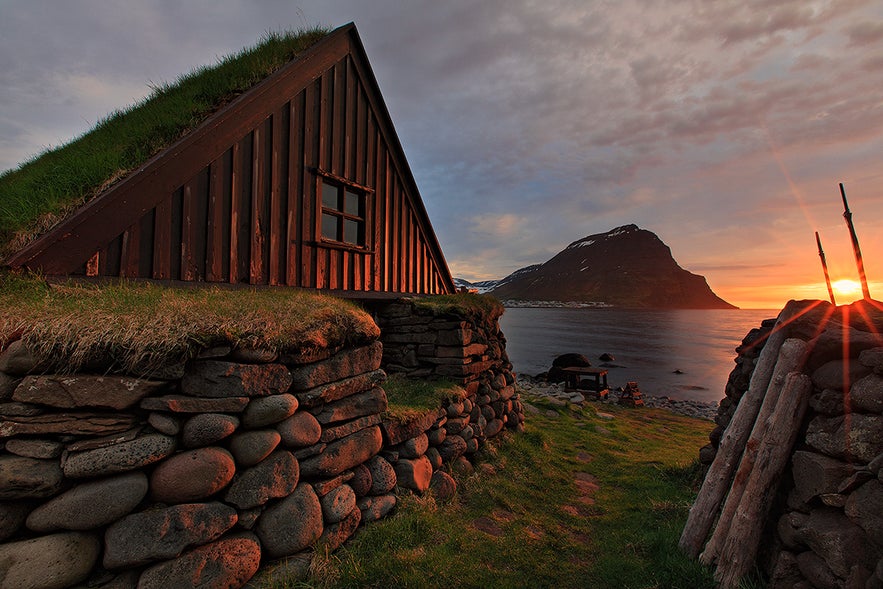
Mietwagen-Rundreisen
Mit diesen Touren erkundest du Islands Ringstraße und die Westfjorde flexibel und unabhängig.
-
13-tägige Mietwagen-Rundreise: Ringstraße, Snaefellsnes & Westfjorde
-
10-tägige Sommer-Mietwagenreise: Ringstraße mit Wasserfällen & Gletschern
Reisepakete
Reisepakete kombinieren Flüge, Unterkünfte und Aktivitäten für ein sorgenfreies Westfjorde-Erlebnis.
Mehrtages-Gruppentouren
Geführte Mehrtagestouren bieten Erlebnisse mit erfahrenen Guides und durchdachten Routen.
-
Kleine Gruppe: 3-tägige Westfjorde-Rundreise mit Transfer ab Reykjavik
-
6-tägige Wanderreise im Hornstrandir mit Camping in den Westfjorden
-
7-tägige Motorrad-Abenteuertour in den Westfjorden mit Wasserfällen & Gletschern
Tagestouren
Kürzere Tagestouren sind ideal für alle mit wenig Zeit und bieten gezielte Erlebnisse wie Wandern und Sightseeing in den Westfjorden.
-
Private 8-stündige Natur-Sightseeing-Tour in den Westfjorden ab Isafjördur
-
2-stündiger Stadtrundgang durch Isafjördur in den Westfjorden
FAQs zu Isafjördur
Hier findest du die meistgestellten Fragen zu Isafjördur in den Westfjorden.
1. Kann man in Isafjördur die Nordlichter sehen?
Ja! In den Wintermonaten (September–März) gibt es in Isafjördur kaum Lichtverschmutzung – perfekte Bedingungen, um bei klarem Himmel Nordlichter zu beobachten. Am besten zwischen September und März anreisen, die Aurora-Vorhersage prüfen und einen dunklen, offenen Ort wie das Fjordufer oder eine Bergstraße aufsuchen.
2. Wie viele Tage sollte ich mindestens in Isafjördur verbringen?
2–3 Tage reichen, um die Stadt zu erkunden, eine Bootstour zu machen, Wanderungen zu unternehmen und die lokale Küche zu probieren. Abenteuerlustige bleiben gern länger.
3. Welche lokalen Spezialitäten sollte man in Isafjördur probieren?
Probiere Plokkfiskur (traditioneller Fischeintopf), Hardfiskur (Trockenfisch), frische Saiblinge und isländisches Lamm. In den Kaffihús-Bäckereien gibt es zudem leckeres Gebäck.
4. Brauche ich ein Auto für meinen Besuch in Isafjördur?
Ein Auto ist sehr zu empfehlen, um die Umgebung, abgelegene Fjorde, Hornstrandir und den Dynjandi-Wasserfall zu erkunden. Innerhalb von Isafjördur kommt man aber auch gut zu Fuß oder mit dem Fahrrad zurecht.
5. Ist Isafjördur für preisbewusste Reisende geeignet?
Ja, aber Island ist insgesamt teuer. Günstige Optionen sind Gästehäuser, Camping und Selbstverpflegung. Manche Aktivitäten wie Wandern sind kostenlos!
6. Welche Kleidung sollte ich für Isafjördur einpacken?
Packe immer mehrere Schichten, eine wasserdichte Jacke, feste Schuhe, Handschuhe und eine Mütze ein. Auch im Sommer ist das Wetter wechselhaft und es kann windig sein.
7. Gibt es Geheimtipps in Isafjördur, die viele Touristen verpassen?
Isafjördur hat eine lebendige Musikszene, besondere Kunstinstallationen und kleine, familiengeführte Geschäfte, die kaum beworben werden.
Bereit, den Charme von Isafjördur zu erleben?
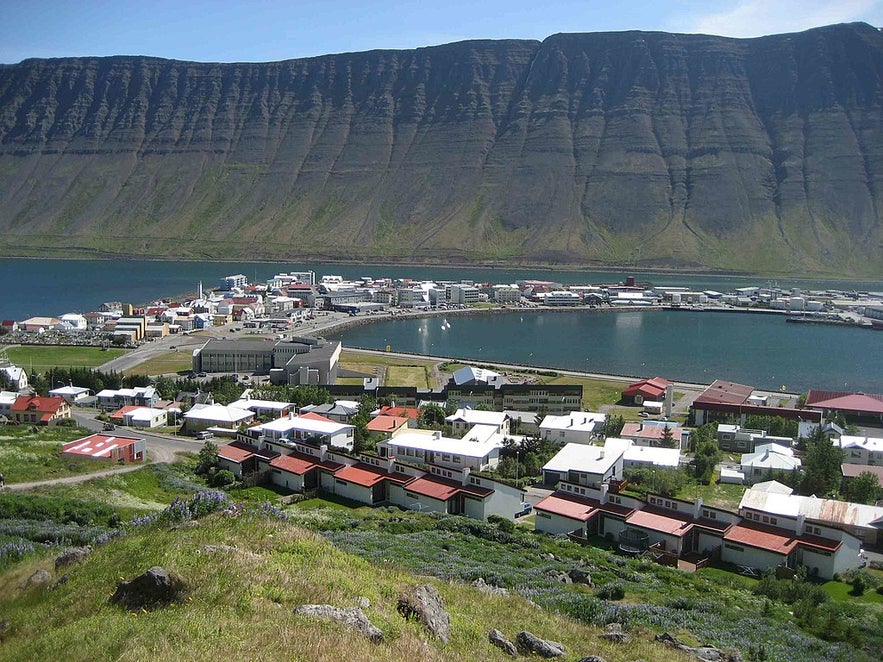
Ob du im Hornstrandir-Naturschutzgebiet wanderst, Wale und Delfine in freier Wildbahn beobachtest oder einfach die Ruhe am Raudisandur-Strand genießen möchtest – Isafjördur hat viel zu bieten.
Buche deine Reise nach Isafjördur und erlebe selbst die Magie der Westfjorde – oder lies mehr über Islands Highlights.
